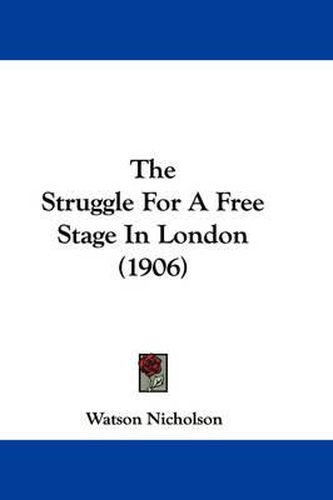Readings Newsletter
Become a Readings Member to make your shopping experience even easier.
Sign in or sign up for free!
You’re not far away from qualifying for FREE standard shipping within Australia
You’ve qualified for FREE standard shipping within Australia
The cart is loading…






Purchase of this book includes free trial access to www.million-books.com where you can read more than a million books for free. This is an OCR edition with typos. Excerpt from book: CHAPTER XV SUMMARY AND CONCLUSION FROM a survey of the struggle from 1660 to 1843, to free the English stage from the patent monopoly granted by Charles II, it will appear a much easier task to point out the causes of the downfall of the patent houses than to explain why the theatrical monopoly was permitted to exist so long. It was a graft so utterly foreign to the England of the nineteenth century, if not, indeed, of the eighteenth century, as to challenge our wonder why it was not lopped off a hundred years and more before it was finally abolished. It may be that the inert temper of the English people, the mere habit of permitting an old institution to continue, in some degree accounts for the old age of the monopoly in theatrical amusements. But a careful analysis of the facts related in the foregoing chapters will, I think, go a long way towards clearing up the phenomenon. An examination of the leading theatrical events connected with our subject will disclose six main periods, each of which stands for a more or less distinct significance in the development of the idea of theatrical monopoly; though of course these divisions overlap and intermingle. In making this epochal analysis, I would emphasize the most general tendencies only. . In the first place, it will appear that, from the J granting of the patents to Killigrew and Dave- nant to about 1720, the ruling sovereigns of the realm never thought for a moment that the grants of Charles II in anywise limited the crown prerogative over public amusements. Charles himself was the first to exercise his authority without regard to his former patent grants, when he united the patents in 1682. William III was advised by his counselors that one King cannot bind a succeeding Prince in the matter of granting theatrical priv…
$9.00 standard shipping within Australia
FREE standard shipping within Australia for orders over $100.00
Express & International shipping calculated at checkout
Purchase of this book includes free trial access to www.million-books.com where you can read more than a million books for free. This is an OCR edition with typos. Excerpt from book: CHAPTER XV SUMMARY AND CONCLUSION FROM a survey of the struggle from 1660 to 1843, to free the English stage from the patent monopoly granted by Charles II, it will appear a much easier task to point out the causes of the downfall of the patent houses than to explain why the theatrical monopoly was permitted to exist so long. It was a graft so utterly foreign to the England of the nineteenth century, if not, indeed, of the eighteenth century, as to challenge our wonder why it was not lopped off a hundred years and more before it was finally abolished. It may be that the inert temper of the English people, the mere habit of permitting an old institution to continue, in some degree accounts for the old age of the monopoly in theatrical amusements. But a careful analysis of the facts related in the foregoing chapters will, I think, go a long way towards clearing up the phenomenon. An examination of the leading theatrical events connected with our subject will disclose six main periods, each of which stands for a more or less distinct significance in the development of the idea of theatrical monopoly; though of course these divisions overlap and intermingle. In making this epochal analysis, I would emphasize the most general tendencies only. . In the first place, it will appear that, from the J granting of the patents to Killigrew and Dave- nant to about 1720, the ruling sovereigns of the realm never thought for a moment that the grants of Charles II in anywise limited the crown prerogative over public amusements. Charles himself was the first to exercise his authority without regard to his former patent grants, when he united the patents in 1682. William III was advised by his counselors that one King cannot bind a succeeding Prince in the matter of granting theatrical priv…